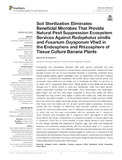Please use this identifier to cite or link to this item:
http://ir-library.mmust.ac.ke:8080/xmlui/handle/123456789/2272| Title: | Soil Sterilization Eliminates Beneficial Microbes That Provide Natural Pest Suppression Ecosystem Services Against Radopholus similis and Fusarium Oxysporum V5w2 in the Endosphere and Rhizosphere of Tissue Culture Banana Plants |
| Authors: | Ochieno, Dennis M. W. |
| Keywords: | Soil, Sterilization, Eliminates, Beneficial, Microbes, Provide, Natural, Pest, Suppression, Ecosystem, Services, Against, Radopholus similis, Fusarium Oxysporum, V5w2, Endosphere, Rhizosphere, Tissue Culture, Banana, Plants |
| Issue Date: | 1-Mar-2022 |
| Publisher: | Frontiers in Sustainable Food Systems |
| Abstract: | Endosphere and rhizosphere microbes offer plant growth promotion and pest suppression ecosystem services in banana-based agroecosystems. Interest has been growing towards the use of such beneficial microbes in protecting vulnerable tissue culture banana plants against pathogens such as Radopholus similis and Fusarium oxysporum. A screenhouse experiment with potted tissue culture banana plants was conducted using sterile and non-sterile soil to investigate the effect of soil biota on R. similis and F. oxysporum strain V5w2. Plants grown in non-sterile soil had lower damage and R. similis density in roots and rhizosphere, while most plant growth-related parameters including root freshweight, shoot freshweight, total freshweight, plant height, and leaf size were larger compared to those from sterile soil. Shoot dryweight and Mg content were higher in plants from sterile soil, while their leaves developed discolored margins. R. similis-inoculated plants in sterile soil were smaller, had more dead roots, higher nematode density, and produced fewer and smaller leaves, than those from non-sterile soil. For all plant growth-related parameters, nematode density and root damage, no differences were recorded between controls and F. oxysporum V5w2-inoculated plants; and no differences between those inoculated with R. similis only and the ones co-inoculated with the nematode and F. oxysporum V5w2. Banana roots inoculated with F. oxysporum V5w2 were lighter in color than those without the fungus. Independent or combined inoculation of banana plants with F. oxysporum V5w2 and R. similis resulted in lower optical density of root extracts. In vitro assays indicated the presence of Fusarium spp. and other root endophytic microbes that interacted antagonistically with the inoculated strain of F. oxysporum V5w2. It is concluded that, soil sterilization eliminates beneficial microbes that provide natural pest suppression ecosystem services against R. similis and F. oxysporum in the endosphere and rhizosphere of tissue culture banana plants. I recommend the integration of microbiome conservation into tissue culture technology through the proposed “Tissue Culture Microbiome Conservation Technology.” |
| URI: | https://doi.org/10.3389/fsufs.2022.688194 https://www.frontiersin.org/articles/10.3389/fsufs.2022.688194/full http://ir-library.mmust.ac.ke:8080/xmlui/handle/123456789/2272 |
| Appears in Collections: | Gold Collection |
Files in This Item:
| File | Description | Size | Format | |
|---|---|---|---|---|
| fsufs-06-688194.pdf | 2.9 MB | Adobe PDF |  View/Open |
Items in DSpace are protected by copyright, with all rights reserved, unless otherwise indicated.
